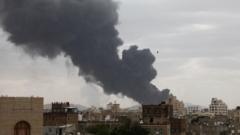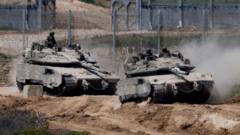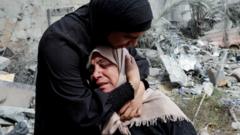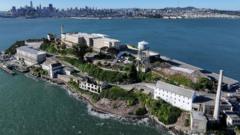President Trump’s unexpected announcement on Tuesday to end U.S. airstrikes on the Iranian-backed Houthi militia has stirred both hope and skepticism among analysts and observers. Speaking in the Oval Office alongside Canadian Prime Minister Justin Trudeau, Trump claimed that the Houthis had expressed a desire to cease fighting. “They just don’t want to fight,” he stated, indicating a readiness to take their word on stopping attacks on international shipping.
US to Halt Bombings of Houthis Amid Complex Middle East Dynamics

US to Halt Bombings of Houthis Amid Complex Middle East Dynamics
Trump's decision to stop US airstrikes comes as the Houthis express a willingness to cease hostilities, raising questions about regional security.
Following Trump's comments, Houthi official Mohammed Al-Bukhaiti acknowledged that if the U.S. ceased its bombings in Yemen, the Houthis would refrain from targeting American military interests. However, he clarified the group’s intent to continue supporting Gaza against Israel's actions, adding a layer of complexity to the potential for lasting peace. “We will fight until Judgment Day if we must,” he proclaimed, emphasizing their commitment to this cause regardless of U.S. military presence.
Analysts like Gregory Johnsen, a former member of the UN Security Council's Panel of Experts on Yemen, remain skeptical. He expressed doubt about the Houthis' actual intentions to halt their military operations entirely. The conflicting messages from both U.S. officials and Houthi leadership underscore the unpredictable and turbulent nature of the region, especially concerning maritime security. Past incidents have shown the Houthis' willingness to strike vessels, regardless of their affiliations, which casts doubt on a straightforward end to hostilities.
As international attention turns toward the ongoing implications of this decision, the situation remains fluid, with many awaiting tangible actions rather than just words in a conflict that has sustained violence for many years.
Analysts like Gregory Johnsen, a former member of the UN Security Council's Panel of Experts on Yemen, remain skeptical. He expressed doubt about the Houthis' actual intentions to halt their military operations entirely. The conflicting messages from both U.S. officials and Houthi leadership underscore the unpredictable and turbulent nature of the region, especially concerning maritime security. Past incidents have shown the Houthis' willingness to strike vessels, regardless of their affiliations, which casts doubt on a straightforward end to hostilities.
As international attention turns toward the ongoing implications of this decision, the situation remains fluid, with many awaiting tangible actions rather than just words in a conflict that has sustained violence for many years.






















